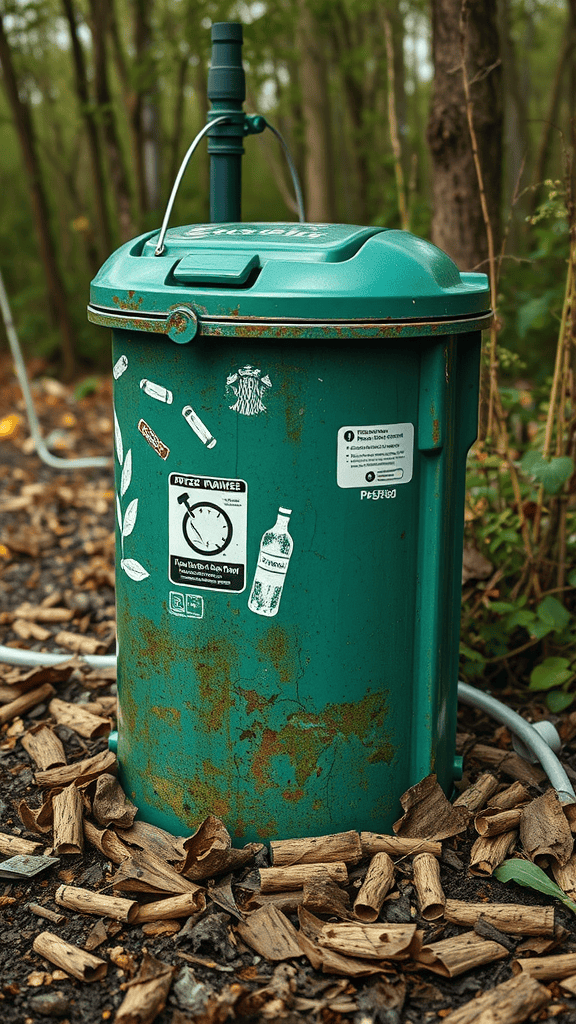Understanding the Role of a Garbage Decomposer in Waste Management
When you think about waste management, you might imagine landfills or recycling bins. However, there is an often-unnoticed hero in the world of waste: the garbage decomposer. These amazing organisms play a vital role in breaking down and recycling waste materials, transforming them into resources that benefit our environment.
What Is a Garbage Decomposer?
A garbage decomposer refers to any organism that breaks down organic matter. This group mainly includes bacteria, fungi, and some insects. They efficiently transform waste through decomposition, which is a natural process that recycles nutrients back into the ecosystem.
How Does a Garbage Decomposer Work?
The work of a garbage decomposer involves several stages, each crucial for the effective breakdown of waste materials:
- Ingestion: Decomposers feed on organic waste such as food scraps and plant materials. By consuming these materials, they begin the decomposition process.
- Digestion: Through various biological processes, decomposers break down complex organic compounds into simpler ones. This often involves the release of enzymes that help digest tough materials.
- Release of Nutrients: As decomposers break down organic matter, they release nutrients back into the soil. These nutrients, which include nitrogen, phosphorus, and potassium, are essential for plant growth.
- Formation of Humus: Over time, the breakdown of organic material leads to the formation of humus, which improves soil structure and fertility, making it more capable of retaining moisture and nutrients.
Why Are Garbage Decomposers Important?
Understanding the importance of garbage decomposers in waste management can help you appreciate their role:
- Reducing Waste Volume: By breaking down organic waste, decomposers help reduce the amount of material sent to landfills. This not only prolongs the lifespan of existing landfills but also minimizes environmental pollution.
- Enhancing Soil Quality: The nutrients released during the decomposition process enrich the soil, promoting healthy plant growth and enhancing agricultural productivity.
- Supporting Biodiversity: Healthy decomposer populations contribute to biodiversity, enabling various plants and animals to thrive together in a balanced ecosystem.
- Carbon Cycle Contribution: Decomposers play a significant role in the carbon cycle by breaking down organic matter, which fixes carbon back into the soil, reducing atmospheric carbon and helping mitigate climate change.
The Role of Decomposers in Composting
One way to harness the power of garbage decomposers is through composting. Composting is a method of recycling organic waste into a valuable soil amendment. Here’s how decomposers contribute to the composting process:
- Breaking Down Material: As organic waste is added to a compost pile, decomposers immediately start to break it down. This accelerates the composting process.
- Maintaining Temperature: The activity of decomposers produces heat, which helps in killing harmful pathogens and weed seeds present in the organic material.
- Creating a Healthy Ecosystem: A well-managed compost pile supports a diverse community of decomposers, ensuring the process is efficient and effective.
Encouraging Decomposers in Your Home
There are simple ways you can encourage garbage decomposers in your home:
- Compost: Start a compost pile or bin to recycle kitchen scraps. Include a mix of greens (nitrogen-rich materials) and browns (carbon-rich materials) for optimal decomposition.
- Avoid Chemicals: Stay away from chemical fertilizers and pesticides, as they can harm beneficial decomposers in the soil.
- Mulch: Use organic mulch in your garden. It provides nourishment for decomposers while retaining moisture in the soil.
By recognizing the essential role of garbage decomposers in waste management, we can foster conditions that allow these organisms to thrive. This not only contributes to cleaner environments but also supports a healthier ecosystem overall. So next time you dispose of waste, think about the invaluable help provided by these tiny environmental allies.
The Science Behind How Garbage Decomposers Function
The world around us relies heavily on processes that break down organic waste, and one of the most crucial players in this system is the garbage decomposer. These organisms, which can include bacteria, fungi, and other microorganisms, play a significant role in recycling nutrients and maintaining health in ecosystems. Understanding how garbage decomposers function is vital for appreciating their role in nature.
At the heart of decomposition is a process known as biodegradation. This is when organic materials are broken down into simpler substances. Garbage decomposers contribute to this process by using their biological capabilities to convert waste into usable forms. Here’s how they do it:
- Identification of Material: Garbage decomposers first identify the organic material present. This could be anything from food scraps to plant debris. They possess enzymes that help them recognize and break down complex molecules like proteins, fats, and carbohydrates.
- Secretion of Enzymes: Once the decomposer identifies the organic material, it secretes specific enzymes into the surrounding environment. These enzymes act like scissors, cutting the large, complex molecules into smaller, more manageable pieces.
- Absorption of Nutrients: After breaking down the materials, decomposers then absorb the simpler molecules through their cell walls. This process allows them to obtain energy and nutrients necessary for their growth and reproduction.
- Release of Byproducts: As the decomposers digest organic matter, they produce byproducts such as carbon dioxide and water. These byproducts are released back into the environment and are vital for the cycles of nutrients and energy in ecosystems.
One fascinating aspect of garbage decomposers is their efficiency. The effectiveness of these organisms can be influenced by various environmental factors, including:
- Temperature: Most decomposer organisms thrive in warm environments. Higher temperatures can accelerate the decomposition process, allowing waste to break down more quickly.
- Moisture: Decomposers require moisture to survive. Excessively dry environments can inhibit their activity, while appropriate moisture levels can enhance it.
- Oxygen Levels: Many decomposers are aerobic, meaning they require oxygen to function. However, some operate in anaerobic environments, such as deep soil or landfills, which allows them to break down materials without oxygen.
Compost is one of the most practical applications of understanding garbage decomposers. By utilizing these organisms, you can transform kitchen scraps and yard waste into nutrient-rich compost. The process is simple:
- Collect Organic Waste: Gather food scraps, yard clippings, and other biodegradable items.
- Create a Compost Pile: Layer your waste, ensuring a mix of “green” materials (like fruit scraps) and “brown” materials (like dry leaves).
- Monitor Conditions: Keep your compost pile moist and turn it regularly to help maintain optimal conditions for your garbage decomposers.
- Harvest Compost: In several weeks to months, the material will break down into dark, crumbly soil good for enriching plants.
Garbage decomposers not only aid in waste management but also play a pivotal role in maintaining soil health. Healthy soil supports plant growth and enhances the food chain. As plants thrive, they provide oxygen and sustenance for countless organisms, including humans.
Understanding the science around garbage decomposers can significantly change how you perceive waste. Instead of seeing garbage as a problem, you can recognize it as a resource that feeds vital ecological processes. By embracing the roles these tiny organisms play, you can engage in better waste management practices that benefit both your environment and our planet.
Garbage decomposers are remarkable organisms that engage in complex processes to recycle nutrients and enhance ecosystems. Their functioning tells a powerful story about the interconnectedness of life, reminding us that every bit of waste can birth new beginnings in the circle of life.
Conclusion
Garbage decomposers play a crucial role in effective waste management by breaking down organic materials, which helps reduce landfill waste and promotes environmental health. When we understand their role, we realize how vital they are in recycling nutrients back into the ecosystem. Whether it’s bacteria, fungi, or other microorganisms, each decomposer has a unique function in transforming waste into valuable components of soil. This process supports plant growth and enhances soil quality, ultimately benefiting agriculture and natural habitats.
The science behind garbage decomposers is fascinating. These tiny organisms efficiently break down complex organic matter through biochemical processes. They feed on food scraps, yard waste, and other biodegradable materials, converting them into simpler substances. This transformation not only clears our waste but also creates humus—a nutrient-rich organic matter essential for healthy soil. Factors such as temperature, moisture, and the type of waste significantly affect how quickly and effectively decomposers work, highlighting the importance of understanding their habitat.
Through better awareness of garbage decomposers, we can actively contribute to sustainable waste management practices. By composting food scraps and using organic materials, you can support these essential organisms and create rich soil for gardening. Embracing these practices not only helps our planet by minimizing waste but fosters a greater appreciation for the natural processes that sustain life. Engaging with and educating others about the importance of garbage decomposers will encourage a more eco-friendly approach to everyday waste.
As an Amazon Associate, I earn from qualifying purchases.

